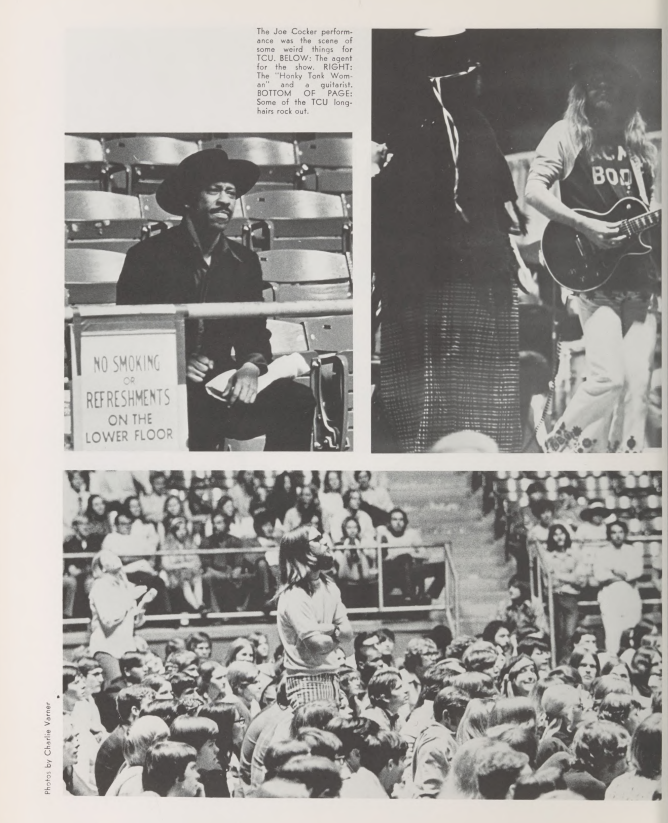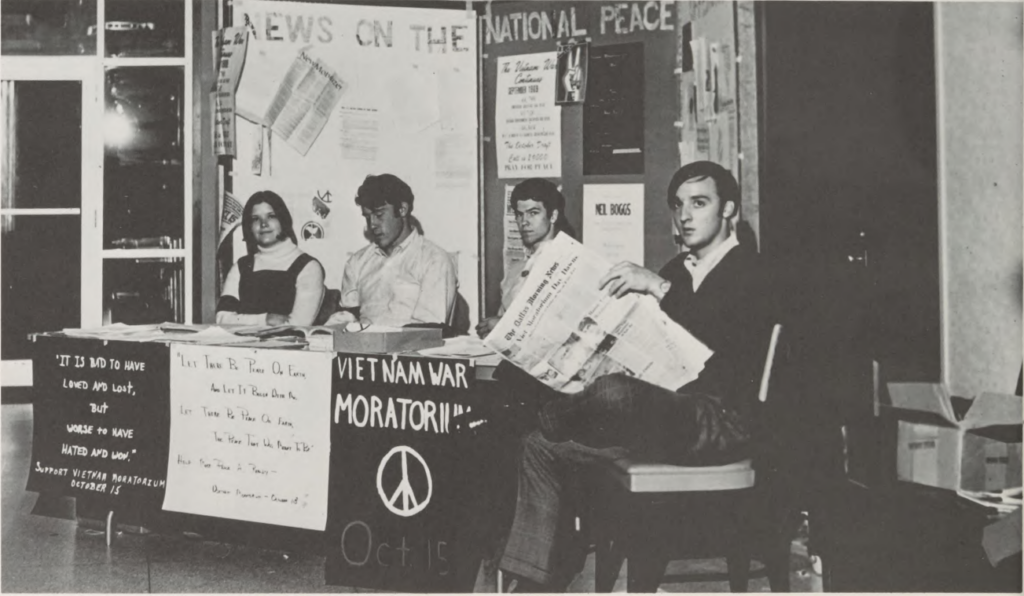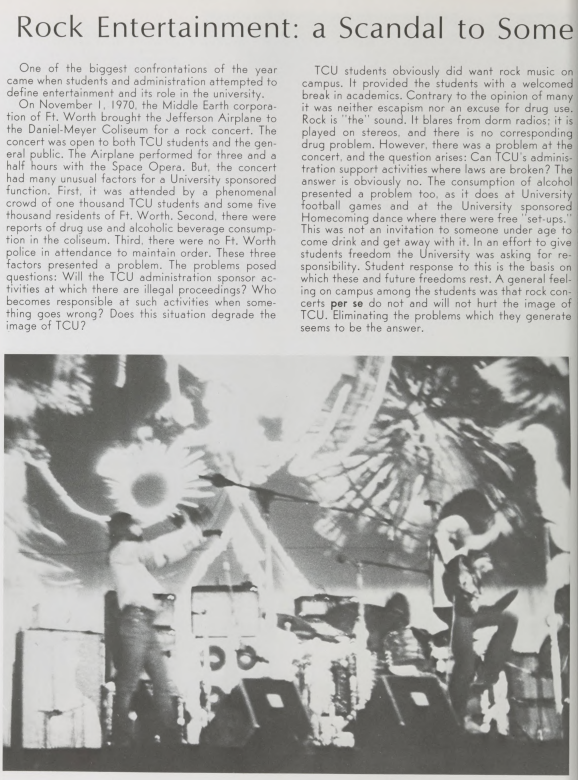Music and the Vietnam War Era

1971 Horned Frog
Public conceptions of the United States’ participation in the Vietnam War were significantly shaped by music. TCU students used music to eloquently express their opposition to the war effort. Some students adamantly opposed the war effort because they felt it contrasted their beliefs and American values. They participated in rock and folk performances that challenged them to think outside of the norms of society, specifically being willing to fight for the country when and if asked to do so. This music also promoted a newfound freedom of expression of feelings and attitudes about war. Students used lyrics on posters, in classroom discussions to argue their cause, and in chants of protest the war in and around campus.
Rock groups like the Animals and Herman’s Hermits, as well as folk and rock musicians like Leon Russel, brought massive young adult crowds to Woodstock and Big Sur, as well as local dances and performances. These artists usually came on stage with the most absurd outfits of the time, and some wore their hair long and raggedy which, then, was a strong indication of young adults’ rebellion to U.S. societal norms.[1]
Around the campus, students used music as a motivator to make personal decisions. Randy Grothe, a student editor of the Skiff, claimed that rock and roll motivated young adults to challenge authority and the norms of society.[2] Prior to this era, in World Wars I and II, most American men fought without question for their country because they saw service as a social responsibility and a privilege. However, during the Vietnam War Americans experienced more tragedies than benefits to service, and so many youth began to reject the idea of participating in yet another war.[3]

1971 Horned Frog
Students expressed their aversion to the war by using lyrics from commonly known music. During the Vietnam War era, a new leftist movement was started by youth where some supported self-sacrifice for their country, while others wanted the United States to be at peace. Youth were challenged by their peers to pick sides and fighting for their individual ideologies was important because it identified one’s stance in society.[4] On TCU’s campus, students used posters that quoted the lyrics of songs that promoted a more peaceful America. On one of the posters students used at a table in the student center to advertise the national Moratorium to End the War in Vietnam, students quoted lyrics from the song “Let there be peace on Earth,” originally written by Jill Jackson-Miller and Sy Miller in 1955. The poster reads, “let there be peace on Earth and let it begin with me,” alluding to the idea that if students were to participate in the war, they would be hostile or even violent; instead, peace should start with students who refused to participate.

1971 Horned Frog
Students’ participation in concerts at the Daniel-Meyer Coliseum on November 1,1970 created a massive disturbance to faculty and staff. The Athletic Director was reluctant to hold the concert because he feared that the basketball court would be damaged by those attending the concert. Unfortunately, his presumptions were correct as he received Maintenance Department calls complaining that “there was too much rubbish which included whiskey bottles, beer cans, and chewing gum.”[5] In regard to marijuana use, the director of student activities, Mrs. Proffer, said that the crowds used marijuana and were impossible to control. She called for an end to gathering students for rock concerts altogether.[6]
Despite the administration’s distaste of the rock culture that dawned on TCU, students continued to participate in concerts that changed the school’s culture. Randy Grothe, a TCU student, noted that music on campus, as well as music at large events like dances and at the bars surrounding campus, changed from soft and easy to hot and heavy.[7] The era brought drastic changes in the culture and direction of the culture and youth at TCU.
Students indulged in discussions during class with professors following political debates regarding the President and his intentions with the war. TCU’s 1971 yearbook noted that following Nixon’s national call to cease fire in Vietnam, professors paused class time to invite discussion on what the future of America would possibly look like. At events with political speakers, students wore black armbands which showed their support for a period of peace. During political forums with notable guest speakers like Senator Al Gore, Sr., who expressed dovish views regarding Vietnam, students expressed their support for a more peaceful state for the country. Gore received applause from most of the students in attendance at the November Moratorium, following President Nixon’s announcement for a standstill in Vietnam.[8]
Large performances by rock and folk musicians and music played in and around TCU campus influenced students’ behaviors and attitudes towards the war, prompting students to make changes to the culture of TCU. Some students indulged in rebellious behaviors at concerts, educational discussions about national events, and campus-wide protests. This new culture propelled some students to oppose the war efforts and created conflict between administration and students on campus.
[1] “Digesting the Rock and Roll Stew,” The Horned Frog, (1973), 74, Special Collections, Mary Courts Burnett Library, Texas Christian University.
[2] “Forums Notables,” The Horned Frog, (1970), 74, Special Collections, Mary Courts Burnett Library, Texas Christian University.
[1] “Digesting the Rock and Roll Stew,” The Horned Frog,1973, 74, Special Collections, Mary Courts Burnett Library, Texas Christian University.
[2] “Digesting the Rock and Roll Stew,” The Horned Frog,1973, 74, Special Collections, Mary Courts Burnett Library, Texas Christian University.
[3] Maurice Isserman and Michael Kazin, America Divided: The Civil War of the 1960s (New York: Oxford University Press, 2004), 165.
[4] Isserman and Kazin, America Divided,165.
[5] Shirley Farrell, “Concert Question Focuses on Pot” The Skiff, November 10, 1970, 2, Special Collections, Mary Courts Burnett Library, Texas Christian University.
[6] Farrell, “Concert Question Focuses on Pot.”
[7] “Digesting the Rock and Roll Stew,” The Horned Frog (1973), 74, Special Collections, Mary Courts Burnett Library, Texas Christian University.
[8] “Forums Notables,” The Horned Frog, (1970), 74, Special Collections, Mary Courts Burnett Library, Texas Christian University.
For Further Reading
Andresen, Lee. Battle Notes: Music of the Vietnam War (Superior, Wisconsin: Savage Press, 2003).
Anderson discusses how music impacted American soldiers of all ages in the war. He uses historical data to further explain how protestors used music to enhance their opinions on the war effort. This book contains numerous personal reflections of the impact of Vietnam from soldiers, citizens, and some artists of the time.
Bradley, Doug, and Craig Hansen Werner. We Gotta Get out of This Place: The Soundtrack of the Vietnam War (Amherst: University of Massachusetts Press, 2015).
This book utilizes interviews from veterans to describe how music was used as a lifeline to connect soldiers with what was going on in the American world. It contains firsthand thoughts and experiences on how Americans reacted to governmental operations from the selection process of soldiers to how musicians changed the American culture. Musicians also have made contributions in this book. They spoke about their purpose for writing the music they wrote and explained how they felt about the impact they had on the American youth.
Kramer, Michael J. The Republic of Rock: Music and Citizenship in the Sixties Counterculture (New York: Oxford University Press, 2017).
If you are interested in learning more about how popular music in the 1960s shaped American culture and counterculture, The Republic of Rock: Music and Citizenship in the Sixties Counterculture by Michael Kramer is for you. In this reading, the author provides insight to how rock music shaped the ideas of what individual freedom and collective belonging looked like for American youth, specifically in San Francisco, California and on the Vietnam warfront. The author uses interviews and historical governmental data to make connections between politics and music.